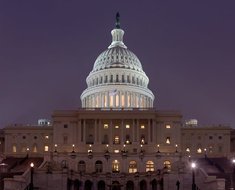|
Question or Term
|
Answer
|
|
Close cooperation between the two major parties to achieve political goals, often crucial for success in the US and to prevent gridlock
|
Bipartisanship
|
|
That, which American observers sometimes criticise the UK constitution for potentially allowing due to weaker checks and balances
|
Autocratic Government
|
|
The President's constitutional power to return a bill to Congress unsigned with the reasons for objection
|
Presidential Veto
|
|
The third stage of the legislative process in which the order in which bills will be debated is decided (by the House Rules Committee in the House of Representatives, and by a unanimous consent agreement in the Senate)
|
Timetabling
|
|
That position in government the principle benefit of which is that partisan concerns may be less prevalent and thus less conducive to obstruction
|
Bipartisanship
|
|
That body which has proved the most significant obstacle to the success of constitutional amendments
|
Congress
|
|
That the power of which has been increased by; westward expansion, population growth, industrialisation (requiring regulation), The Great Depression, improved communications (creating a national identity), the increased scope of foreign policy (solely the purview of the federal government), Supreme Court decisions, and Constitutional Amendments
|
Federal Government
|
|
The 1913 amendment that made the Senate a directly elected rather than appointed body
|
Seventeenth Amendment
|
|
Those which there have been very few of as; they are difficult to get passed, the Constitution is venerated while also being vague and thus flexible, and the Supreme Court can reinterpret the Constitution without the need to go through the formal process
|
Constitutional Amendment
|
|
That which, when under divided government, is criticed for often being done for political or partisan motivations rather than int he public or national interest
|
Congressional Oversight
|
|
|
Question or Term
|
Answer
|
|
That, two recent marginally defeated examples of which are to mandate a balanced budget, and to outlaw flag desecration
|
Constitutional Amendment
|
|
The three key principles of the US Constitution in alphabetical order
|
Checks and Balances, Federalism, and Separation of Powers
|
|
That the powers of which relative to the other branches of government are; to control the budget, vet presidential nominees, reject presidential vetoes and treaties, and to initiate and try impeachment cases
|
Congress
|
|
That body in which 'gridlock' can be a benefit, as it ensures legislation in considered thoroughly while also keeping the government in check
|
Congress
|
|
Those two bodies in one or the other of which, three quarters of members must ratify an amendment for it to be successful, in alphabetical order
|
State Conventions or State Legislatures
|
|
The portion of Article VI of the Constitution that makes the Constitution, treaties, and federal laws, the 'supreme law of the land'
|
Supremacy Clause
|
|
That event to which George W. Bush's most significant response was to take the two government-sponsored mortgage companies Fannie Mae and Freddie Mac under federal management, and to bail out Wall Street with $700 billion
|
Great Recession
|
|
That the disadvantages of the process of which are that it; can perpetuate outdated practices, can allow unrepresentative minorities or small states to thwart the will of the majority, and that poor examples can still be enacted as with prohibition
|
Amendment
|
|
The percentage of members of the House of Representatives and Senate respecitvely that were women in 2016?
|
19% and 21%
|
|
Powers not delegated to the federal government but instead held by the states or the people per the Tenth Amendment
|
Reserved Powers
|
|

